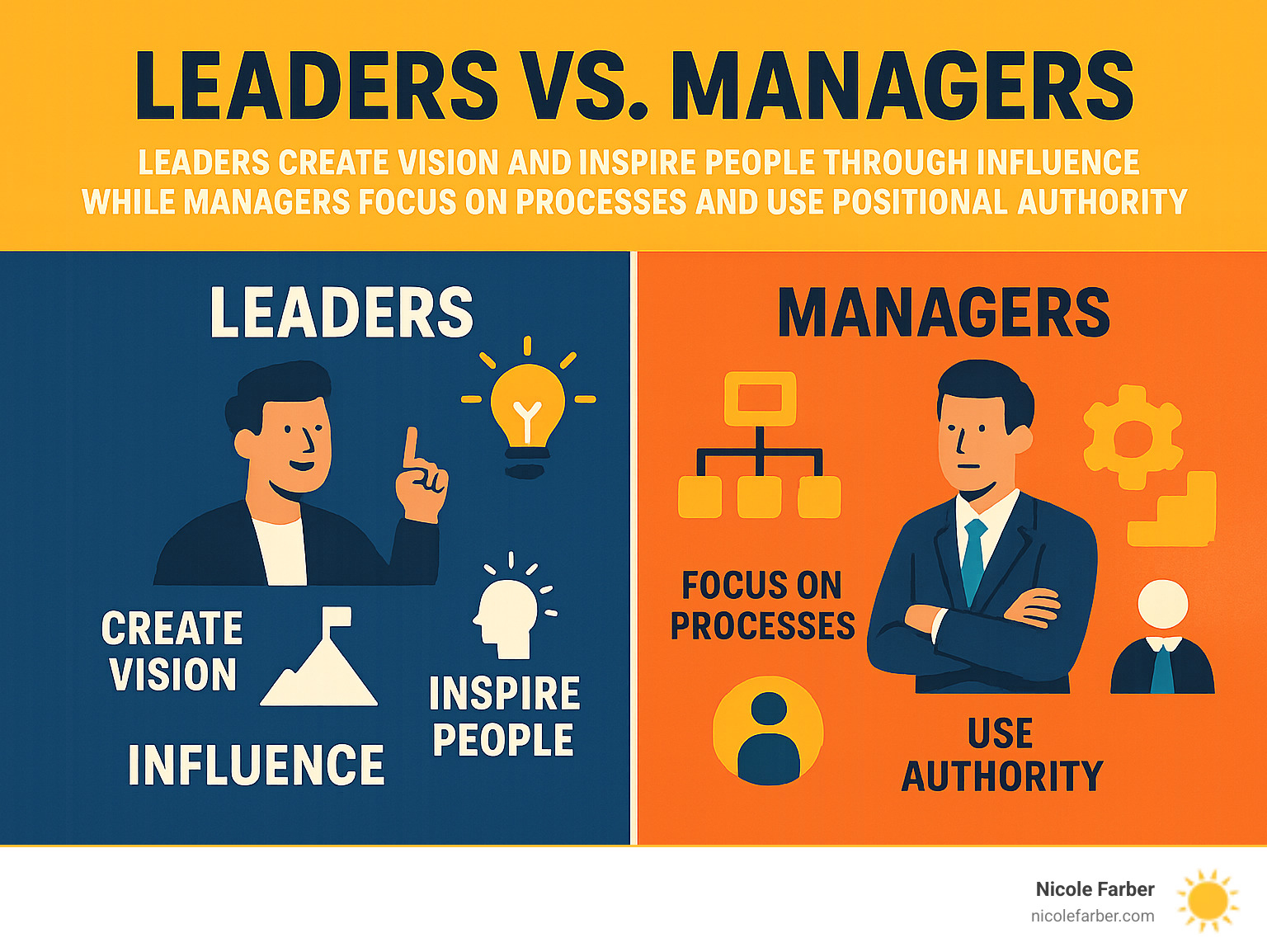Lead the Way: How to Be a Good Leader in the Workplace
- Leadership
- In the News
- September 3, 2025
Why Business Leadership Advice Matters More Than Ever
Business leadership advice is essential for creating thriving workplaces that drive results. As management consultant Peter Drucker said, “A leader is someone who has followers”—but effective leadership goes far deeper than a title. It involves leading by example, focusing on people, communicating with clarity, making decisive choices, building trust, empowering others, and staying adaptable.
Today’s workplace challenges make strong leadership more critical than ever. Poor leadership leads to high turnover and low morale, while effective leaders boost engagement, create positive cultures, and drive sustainable growth. Whether you’re leading a law firm in Philadelphia, managing a team in Wilkes-Barre, or building a business in New Orleans, the fundamentals of good leadership remain the same: it’s about making others more effective.
I’m Nicole Farber, and for over 15 years, I’ve helped business leaders and law firms develop the strategies needed to transform their organizations. Through my work with the American Bar Association and speaking at leadership conferences, I’ve seen how the right leadership approach can completely change a company’s trajectory.

The Foundation of Leadership: Understanding the Core Principles

Leadership isn’t something you can fake; it’s built on solid principles that create real change, whether you’re running a law firm in Philadelphia or a startup in New Orleans. At its heart, business leadership advice starts with understanding that leadership is about influence, not authority. True leaders embody integrity, decisiveness, and confidence.
My 15+ years of experience have shown that positivity and strategic thinking separate good leaders from great ones. Great leaders set high standards to inspire, not intimidate, seeing the bigger picture while staying grounded in daily realities. For deeper insights, explore our business leadership strategies that have helped countless leaders transform their approach.
Leader vs. Manager: More Than Just a Title
Leadership and management are related but distinct skills. Managers focus on processes and systems, ensuring tasks are completed and operations run smoothly. Their authority comes from their position. Leaders focus on people and vision, inspiring others to follow them through influence, trust, and respect.
| Feature | Leader | Manager |
|---|---|---|
| Primary Focus | Vision, inspiration, motivation | Processes, tasks, operations |
| Authority Source | Influence, personal qualities, respect | Positional power, job role |
| Goal | Create new paths, inspire change | Achieve existing objectives, maintain order |
| Approach | Changeal, forward-looking | Transactional, day-to-day |
| Impact | Drives innovation, shapes culture | Ensures efficiency, maintains standards |
| Relationship | Inspires trust and commitment | Directs and controls |
The most effective people I work with—from Wilkes-Barre to Luzerne County—understand they need both skill sets. They know when to manage processes and when to lead people.
The 7 Unshakable Characteristics of an Effective Leader
After working with hundreds of business leaders, I’ve identified seven characteristics that consistently appear in the most effective ones:
- Empathy: Your superpower. Understanding your team’s challenges, motivations, and goals builds loyalty and trust.
- Communication: More than talking clearly. It’s active listening, public recognition, and having courageous conversations.
- Vision: Seeing possibilities others miss and articulating them in a way that inspires people to be part of something bigger.
- Decisiveness: Making confident decisions with the available information. Your team needs you to steer through uncertainty.
- Delegation: An act of trust. It shows you believe in your team’s abilities and gives them opportunities to grow.
- Resilience: How you handle setbacks. Your ability to bounce back with optimism is contagious.
- Self-awareness and learning agility: Continuously seeking feedback and improving creates a culture where everyone feels safe to grow.
For a deeper dive into these foundational principles, check out our insights on the Seven Principles of Leadership.
The Critical Role of Vision and Strategic Thinking
If you’re only focused on today’s problems, you’re not leading—you’re managing crises. True leadership requires strategic thinking about where your organization is heading.
Vision is your North Star, but vision without strategy is just wishful thinking. Strategic thinking turns that vision into reality through concrete plans. Great leaders excel at future planning, anticipating industry changes and preparing their teams. Setting direction means making tough choices about priorities, whether you’re in Antigua Guatemala or Philadelphia. This big-picture perspective helps everyone see how their work contributes to a larger, inspiring shared mission. When you combine clear vision with strategic thinking, you create an organization where people feel connected to meaningful work. For more on this, explore The CEO’s essential checklist.
Mastering Key Leadership Styles for Any Situation

There’s no single leadership formula that works in every situation. Effective leaders adapt their style to their team’s needs and the challenges at hand. I learned this through my own journey as a CEO and single mother; the business leadership advice I give most often is that flexibility is your superpower.
The most successful leaders, whether running law firms in Philadelphia or growing businesses in New Orleans, master multiple leadership styles. They know when to direct, when to support, and when to inspire. To develop these skills, explore our guide on How to become an effective leader.
The Situational Leader: Adapting to Your Team’s Needs
Situational leadership is about matching your approach to each team member’s needs. A new employee may need clear direction, while an experienced professional needs autonomy. The key is flexibility. In dynamic environments like Wilkes-Barre and New Orleans, leaders who adapt their style to both the person and the situation consistently outperform those with a rigid approach. Task complexity also dictates your level of oversight.
The Servant Leader: Putting Your People First
Servant leadership flips the traditional model. Instead of asking, “How can my team serve me?” servant leaders ask, “How can I serve my team?” This means removing obstacles, providing resources, and creating an environment where people can thrive. Active listening and genuine empathy are your most important skills. You build a community and foster growth by investing in your team’s development. When you prioritize your team’s success, they will help you achieve your vision.
The Changeal Leader: Inspiring Change and Innovation
Change is hard, and that’s where changeal leadership is essential. These leaders excel at motivating teams to accept new ideas by providing intellectual stimulation and challenging the status quo. They use personal charisma and influence to build excitement around new initiatives, painting a compelling picture of why the change matters. Whether you’re implementing new technology or restructuring your team, this style helps people see change as an opportunity. As a Business Growth Keynote Speaker, I’ve seen this approach turn challenges into stepping stones for incredible growth.
Actionable Business Leadership Advice for Building a Thriving Team

Building a thriving team isn’t about luck; it’s about intentional leadership. When we use business leadership advice that puts people first, we see higher engagement, better morale, and increased productivity. The difference between a team that’s just getting by and one that’s thriving comes down to creating psychological safety, communicating with care, and empowering people to grow. Our Leadership Development Seminars dive deeper into these practical strategies.
The Power of Empathy and Communication in Leadership
Empathy and communication are not “soft skills”—they are the foundation of effective leadership. Active listening creates a culture where people feel safe to tell the truth. Building genuine rapport happens when we learn about our people as individuals, understanding their goals and motivations. Trust grows through transparency; when we’re open about challenges, our credibility increases. This foundation allows us to persuade and inspire, extending our influence far beyond a job title. As we explore in How Effective Influencing Can Be a Game-Changer, this connection works across diverse teams, from Luzerne County to Antigua Guatemala.
Building Psychological Safety and Trust
Psychological safety means creating an environment where people aren’t afraid to speak up, ask questions, or make mistakes. As Mike Zani, CEO of the Center for Creative Leadership, suggests, leaders must be vulnerable so others feel safe to do the same. When people worry about being punished for mistakes, they stop innovating. Creating a feedback-rich environment where dialogue flows both ways makes people more invested. Fostering a “safe to fail” culture means viewing honest mistakes as learning opportunities, not career-enders. This approach leads to more open dialogue and innovation, reducing costly employee turnover.
How to Effectively Delegate and Empower Your Team
Effective delegation is about gaining capacity while developing your team. It’s not dumping work; it’s strategically empowering people to grow. Trust is the foundation. You must believe your team can handle the responsibility. Give them clear responsibility with autonomy—define the ‘what’ but let them determine the ‘how.’ This provides ownership and accountability. Development through delegation happens when we stretch people with growth opportunities. As our Entrepreneurship work shows, good leaders get out of the way. You’re not responsible for the results—you’re responsible for the people who are.
Your Path to Leadership: A Roadmap for Development and Growth

Leadership is a journey of constant attention, care, and growth. I’ve learned this through my own experience as a single mother building a business. The challenges that once seemed impossible became the very experiences that shaped my leadership style. This continuous journey of business leadership advice and self-improvement is what I’m passionate about sharing as a Female Leadership Speaker.
Practical Steps to Develop Your Leadership Abilities
Leadership development is about intentional work. Start with a SWOT analysis to understand your strengths and weaknesses. Then, use goal setting to create a vision for the leader you want to become. As Elon Musk says, it’s “very important to have a feedback loop.” Seek feedback regularly from your team and peers. Learn from failure; every mistake is a valuable lesson. Find a mentor or coach to guide you, and never stop learning. Read widely from books like Michael D. Watkins’s The First 90 Days, Brené Brown’s Dare to Lead, and James Clear’s Atomic Habits for practical wisdom. When starting a new role, think “future-back” to align your first steps with your long-term goals, a strategy we cover in Start Your New Leadership Role with the End in Mind.
Navigating Common Leadership Challenges Today
Leading today is more complex than ever. Here’s how to steer common problems:
- Managing change and disruption: The pace of change is accelerating. Focus on the “people side” of change, helping your team understand the ‘why’ behind it.
- Leading remote and hybrid teams: Be intentional about creating connection and trust from a distance, whether your team is in Philadelphia, Wilkes-Barre, or New Orleans.
- Preventing burnout: Model healthy boundaries and prioritize wellbeing for yourself and your team. Rest is productive.
- Fostering resilience: Create a supportive, psychologically safe environment where people can bounce back from setbacks.
Essential Business Leadership Advice for the Future of Work
The future of work is already here. Leaders who thrive will accept these skills:
- Learning agility: The ability to learn, unlearn, and relearn quickly is your superpower.
- Digital literacy: Understand how technology, including AI, can help your team be more productive and connected.
- Emotional intelligence: This is critical for managing diverse, distributed teams and navigating complex interpersonal dynamics.
- Adaptability: Stay flexible and willing to adjust your approach based on what your team and the situation need.
- Managing hybrid work models: Create equity between in-person and remote team members so everyone has the same opportunities.
These skills are essential for modern leadership, especially in specialized fields, as we explore in our Business Coaching for Lawyers resources.
Frequently Asked Questions about Business Leadership
Over my years working with entrepreneurs and law firms, certain questions come up repeatedly. Here is some concise business leadership advice to address the most common concerns.
What’s the first step for someone transitioning into a leadership role?
Listen first, act second. Resist the urge to make immediate changes. Your first 90 days should be focused on learning. Start by building relationships through one-on-one conversations to understand each person’s role, challenges, and goals. Pay attention to team dynamics to identify informal leaders and friction points. Once you’ve listened, set clear expectations for your vision and approach. You’re responsible for the people who are responsible for the results. Your role is to support and empower, not just direct.
How can leaders foster a positive workplace culture?
Culture is actively created by leaders every day. The most effective way to build a positive culture is to model the values you want to see. This includes:
- Open communication: Share information honestly, even when it’s difficult. Trust is built on transparency.
- Recognition: Celebrate both big wins and small improvements. Acknowledging great work, whether in your Wilkes-Barre or New Orleans office, shows everyone what excellence looks like.
- Work-life balance: Set the tone by respecting boundaries and encouraging your team to disconnect and recharge.
- Inclusivity: Create an environment where diverse perspectives are welcomed and everyone feels they belong.
How can I get leadership experience if I’m not in a management role?
Leadership is about influence, not a title. You can gain experience right where you are. Volunteer for projects that stretch your skills. Raise your hand to lead a process improvement or coordinate an event. Mentor junior colleagues, whether at a law firm in Philadelphia or in your local community; this builds your coaching and feedback skills. Seek community leadership opportunities on local boards or volunteer initiatives to manage people and projects outside of work. The key is to develop your influencing skills by inspiring and persuading peers, even without formal authority.
Conclusion
Leadership is a journey of continuous learning and growth. We’ve explored the core characteristics of effective leaders, the importance of adapting your style, and actionable strategies for building a thriving team. The business leadership advice shared here is practical wisdom drawn from real-world experience in places from Philadelphia to New Orleans.
Your path forward requires embracing continuous improvement. The fundamentals remain the same: lead with empathy, communicate with clarity, and always put your people first. The future of work demands leaders who are adaptable, strategic, and can maintain genuine human connections.
What excites me most about leadership is its ripple effect. As someone who balanced single motherhood with building a business, I know leadership isn’t about perfection; it’s about showing up consistently and learning from mistakes. At Nicole Farber, we believe leadership is ultimately about service—creating environments where others can thrive.
Ready to transform your leadership impact? Contact a motivational leadership keynote speaker to inspire your team and find how authentic leadership can revolutionize your organization’s future.
